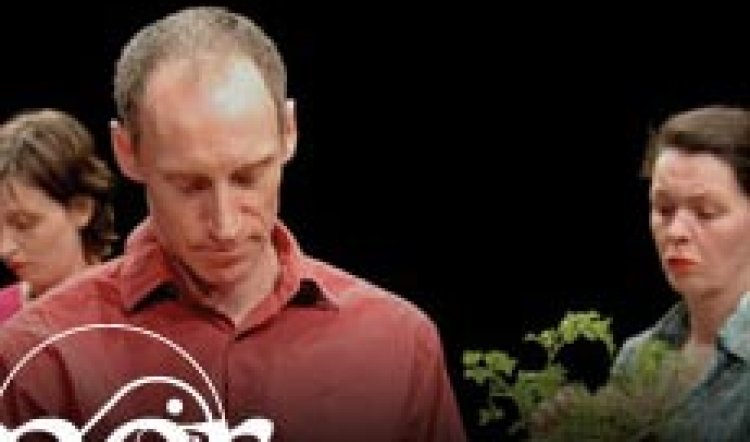
Kommer
Kassys is a "theatre-initiative" based in Amsterdam and its work, according to the program, combines theatre and film. The show the company has brought to Adelaide - Kommer - is half and half but certainly not combined: the first element features the actors live on stage, then the actors leave and what happens to them after that is seen on screen.
From their farewells in the dressing room ("that went well, they seemed to like it") each actor goes his or her way into the night - they troop out of the auditorium - to return in person only for their curtain call. It's a witty idea among many witty ideas that make the first half of the piece intriguing, quirky and often weirdly funny.
Grief - Kommer - is the topic and the actors spin a web of the unintentionally hilarious cliches which are most often expressed in times of grief. Movement is stylised, suggesting the trauma of shock and grief as well as the paralysis of those who are unsure how to cope with the grief of others. The hierarchy of grief is also played out: I am the grieving widow, I am in charge of feelings, I say grieve; you say how deeply? Illogical behaviour reigns supreme, some of it intensely moving, some of it totally ridiculous. All of it suggesting the ways humans go about dealing - or not dealing - with loss.
There is a brilliant scene involving extreme potplant and shrub abuse which illustrates how clever and original Kassys can be, But that high degree of creativity is not maintained. The filmed section is the greatest disappointment, but it could well be a cultural misunderstanding. There was a handful of people in the audience who found the whole show very, very funny. One man in particular guffawed loudly throughout. Were they and was he Dutch? Or was he one of those people who react hysterically to discomfort and puzzlement? Who knows.
The look and feel of the filmed section is reminiscent of Dogme movies so perhaps Kommer is Dogme-theatre. It is certainly theatre with little artifice (which means, of course, that it is all artifice) and it is about very ordinary people doing very ordinary things in very ordinary lives. Or so it seems. The filmed section - depicting what the actors do after they leave the theatre is at once mundane and also wildly peculiar.

When he "real" actors disappear from the stage to be replaced by their filmed selves in a documentary-style depiction of their "real" lives, the audience is also faced with dealing with different aspects of reality. Because of our exposure to film culture, we are accustomed to documentary being "real" whereas the film in Kommer only looks like documentary and very quickly becomes surreal. So the layers of reality and artifice are extended well beyond any normal expectation.
The nice older man who is so sympathetic to the young widow actually lives alone in an unpacked apartment, has a BMW coupe in which he tries to kill himself. The young man who nobody seems to like because he's a geek sits in his tiny room and stuffs himself on gross quantities and varieties of junk food; another young woman moonlights as an air hostess and, after changing into her uniform and calmly serving drinks and snacks to passengers on a flight to Malaga, trashes the aircraft toilet. And so on ... incongruous behaviour from normal people. Or normal behaviour from incongruous people.
In retrospect, Kommer is one of the more unexpected, unpredictable and original works in this Adelaide Festival and spending 75 minutes in the company of Mischa van Dullemen, Lukas Dijkema, Liesbeth Gritter (also the director), Ton Heijligers, Saskia Meulendijks, and Esther Snelder turns out to be more rewarding and memorable than may at first be apparent.



